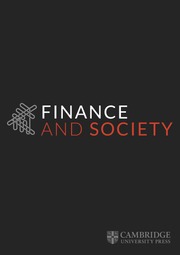Article contents
Hard cash, easy credit, fictitious capital: Critical reflections on money as a fetishised social relation
Published online by Cambridge University Press: 09 November 2023
Abstract
This article explores some aspects of money as a social relation. Starting from Polanyi, it explores the nature of money as a non-commodity, real commodity, quasi-commodity, and fictitious commodity. The development of credit-debt relations is important in the last respect, especially in market economies where money in the form of coins and banknotes plays a minor role. This argument is developed through some key concepts from Marx concerning money as a fetishised and contradictory social relation, especially his crucial distinction, absent from Polanyi, between money as money and money as capital, each with its own form of fetishism. Attention then turns to Minsky's work on Ponzi finance and what one might describe as cycles of the expansion of easy credit and the scramble for hard cash. This analysis is re-contextualised in terms of financialisation and finance-dominated accumulation, which promote securitisation and the autonomisation of credit money, interest-bearing capital. The article ends with brief reflections on the role of easy credit and hard cash in the surprising survival of neo-liberal economic and political regimes since the North Atlantic Financial Crisis became evident.
- Type
- Article
- Information
- Creative Commons
- This is an Open Access article, distributed under the terms of the Creative Commons Attribution-NonCommercial-No Derivatives licence (http://creativecommons.org/licenses/by-nc-nd/4.0/), which permits noncommercial re-use, distribution, and reproduction in any medium, provided the original work is unaltered and is properly cited. The written permission of Cambridge University Press must be obtained for commercial re-use or in order to create a derivative work.
- Copyright
- © 2015 The Author(s)
References
- 16
- Cited by




